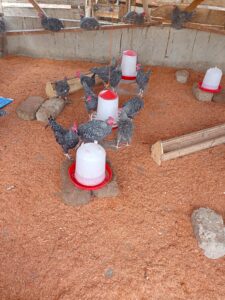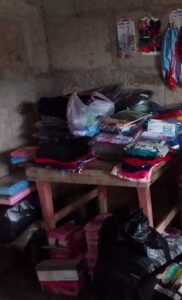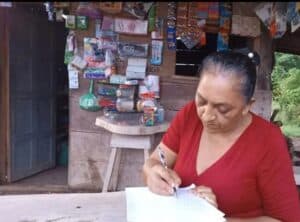
The Graduate Entrepreneurship Program has Given Me the Skills to Help Other Farmers
This report was written by Eva Azuure, a member of the 2019/2020 Graduate Entrepreneurship Program (GEP). Read the original story about her poultry business here. This report was edited by Jessica Crawford, Africa Program Specialist, and Megan Sehr, Development Director.

Eva with her chickens.
Poultry farming is one of the most profitable and popular agribusiness ventures in Ghana. The demand for chickens and eggs is very high, which makes this business one of the best for aspiring agripreneurs. In the 1960s, the Ghanaian government identified poultry production as having the greatest potential for addressing the shortage in both sources of animal protein and jobs.
It is very clear that poultry farming is a viable business venture in the Atwima Nwabiagya Municipality where the Self-Help International Young Adult Training Center is located. This is because poultry farmers in the area have been around for a long time making profits despite the amount of competition that exists.
I can see that the training center carefully considered whether to train entrepreneurs in poultry production as a business venture. I am very delighted for the opportunity I’ve gotten to implement my proposed poultry project as a GEP participant. In fact, it has been an experience of a lifetime and has helped build my capacity in the sector.
This experience has already started yielding good results through the work I’m doing with EggVille farm in the Afoase Kokobeng district of Kumasi.
I was introduced to EggVille farm by Self-Help Ghana Country Director, Benjamin Kusi. Mr. Kusi thought I could assist EggVille with some challenges they were having on the farm. The farm finished their first production cycle with the highest ever recorded egg production rate: 70%. As of this report (early April 2020), the second production cycle was in progress with 9,000 birds, an 8% mortality rate, and an egg production rate of 54%.
When assessing EggVille’s egg production, I used what I learned about poultry broiler production at Self-Help’s training center and received support from Self-Help’s Agriculture & Entrepreneurship Program (AED) staff. I identified the following problems in EggVille’s production: poor litter management, poor feeding management, improper recordkeeping, inadequate water for the birds, and poor disease management.
To address these problems, I sought expert advice from Self-Help’s AED staff and other professionals, such as Dr. Jacob Hamidu, a lecturer from the Animal Sciences Department of the Kwame Nkrumah University of Science and Technology (KNUST). I advised EggVille to undertake the following actions to help increase production: changing the cages’ litter when necessary; cleaning the poultry feeders and drinkers daily; properly recording the eggs, including both cracked and abnormal eggs; and administering antibiotics to help boost the birds’ immune systems.
The interventions taken have yielded positive results – production has increased sharply from 54% to 82%.
In response to my work, EggVille’s owner told Mr. Kusi, “I just want to say a big thank you to Self-Help’s team for introducing Eva to us. She’s been so helpful to us. She is very dedicated, detailed-oriented, and innovative, and we can’t thank her enough.”

 Previous Post
Previous Post Next Post
Next Post


